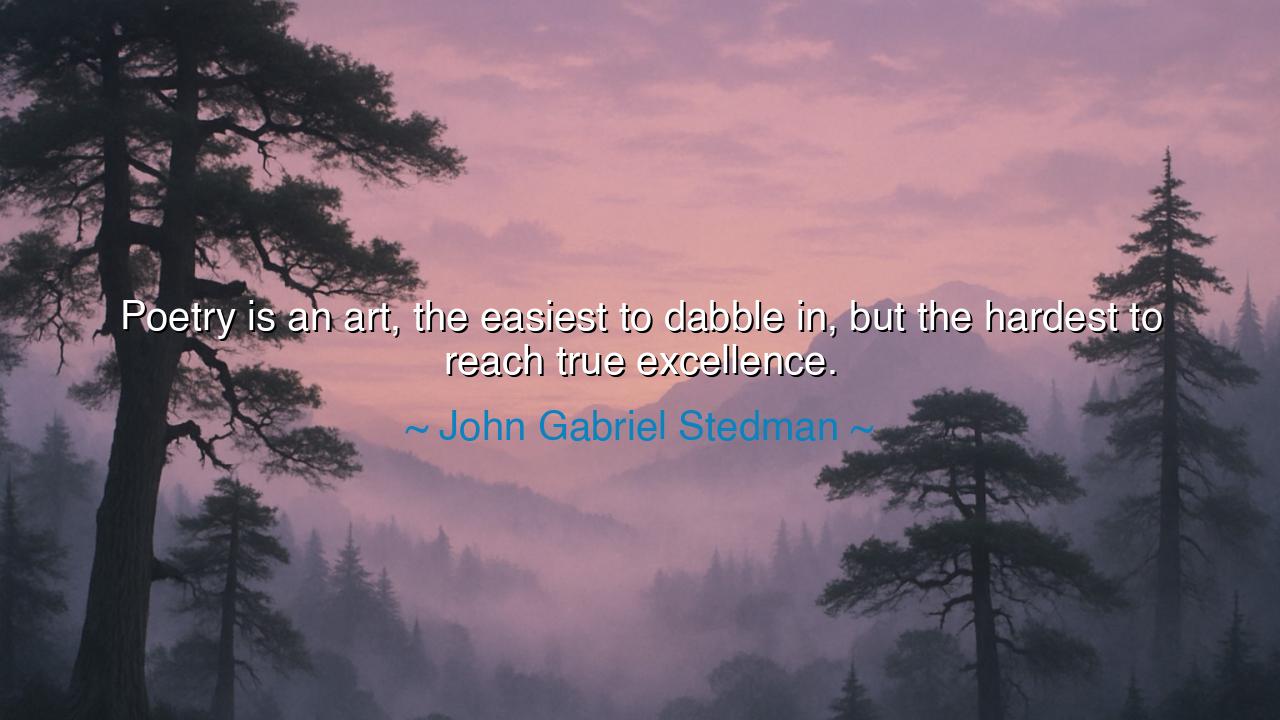
Poetry is an art, the easiest to dabble in, but the hardest to






“Poetry is an art, the easiest to dabble in, but the hardest to reach true excellence.” Thus speaks John Gabriel Stedman, soldier and writer of the eighteenth century, whose words hold the weight of both admiration and warning. His reflection touches on the paradox of poetry: that it invites all who have a voice to try it, yet only a few, through discipline and vision, reach its highest peaks.
The meaning of this saying lies in poetry’s openness and its difficulty. Anyone may pick up a pen and write a rhyme, a verse, a fragment of feeling. Unlike painting, which demands brushes and pigments, or music, which requires instruments and training, poetry needs only words—the common possession of every person. This makes it easy to dabble, for language is ever at hand. But Stedman warns us: to craft poetry that endures, that rises to excellence, is the work of a lifetime, requiring mastery of rhythm, form, image, and the secret fire of imagination.
The origin of this truth can be seen throughout history. Many have written verse, but only a few have carved their names into eternity. Countless poets in Rome tried their hand at elegy, but only Virgil and Horace are still remembered. In England, thousands have written sonnets, but it is Shakespeare’s that remain in the hearts of the world. This is Stedman’s point: the door to poetry is wide open, but the path to greatness within it is narrow and steep.
Consider also the story of Homer. In ancient Greece, poetry was everywhere—sung in marketplaces, chanted at feasts, remembered in fragments by common people. Yet from this vast sea of voices, only a few poets rose to immortality, and Homer stands above them all. His mastery of language, his ability to shape stories into music, set him apart. Many dabbled, but few reached the excellence that makes poetry live across millennia.
The lesson is clear: ease of entry does not mean ease of mastery. Poetry teaches us that the most profound achievements are often hidden behind tasks that seem simple. To write words is easy; to make them sing with truth and beauty is hard. The same applies to life itself: it is easy to begin, but hard to excel, easy to promise, but hard to fulfill. True greatness lies in patience, discipline, and devotion.
Practically, this means that if we wish to write poetry—or excel in any art—we must not be satisfied with dabbling. Read deeply, study the masters, labor over words until they are honed like steel. Accept that failure and mediocrity will come often, but persist. For the climb is steep, but the view from the summit is worth it. In poetry, as in life, only those who endure the long struggle of refinement taste the sweetness of true excellence.
Thus the teaching endures: poetry is a gift available to all, yet a crown granted to few. Stedman’s words call us to humility and to striving, reminding us that while it is easy to join the chorus of verse, it is hard to lift one’s voice so that it echoes through the ages. Let us, then, not be content with dabbling, but aim for excellence, for in that pursuit we honor both ourselves and the eternal art of poetry.






PLNguyen Phuong Lan
I like how Stedman acknowledges the accessibility of poetry while also highlighting its difficulty in reaching excellence. It’s almost like poetry comes with a double-edged sword: anyone can express themselves with poetry, but only a few can truly perfect it. What do you think sets apart an average poem from an excellent one? Is it the depth of insight, the choice of words, or the overall craftsmanship of the poet?
NHNguyen Hao
I agree with Stedman—poetry is deceptively simple to try your hand at, but it requires so much more to reach excellence. Is there a fundamental difference in how we approach poetry compared to other forms of writing? Could it be the expectation of emotional impact within a small number of words that makes it so difficult to excel at? Or is it the pressure to make each word count, leaving no room for excess?
MA04-Tran Minh Anh
Stedman’s observation is interesting. It’s true that anyone can write a poem, but it takes a certain depth of understanding and skill to achieve true excellence. What is it that makes poetry so challenging? Is it the balance between emotion and structure? Or perhaps the difficulty lies in conveying profound meaning in such a concise form? I’d love to hear others’ thoughts on why poetry is so hard to perfect.
HNVu Hai Nam
John Gabriel Stedman’s statement about poetry being easy to dabble in but hard to master really resonates with me. It makes me wonder—why is it that poetry, more than other forms of writing, demands such precision and mastery? Is it because of the brevity and weight of words in poetry? What makes it harder to reach excellence in poetry compared to other creative arts? I’m curious to hear how poets themselves approach this challenge.